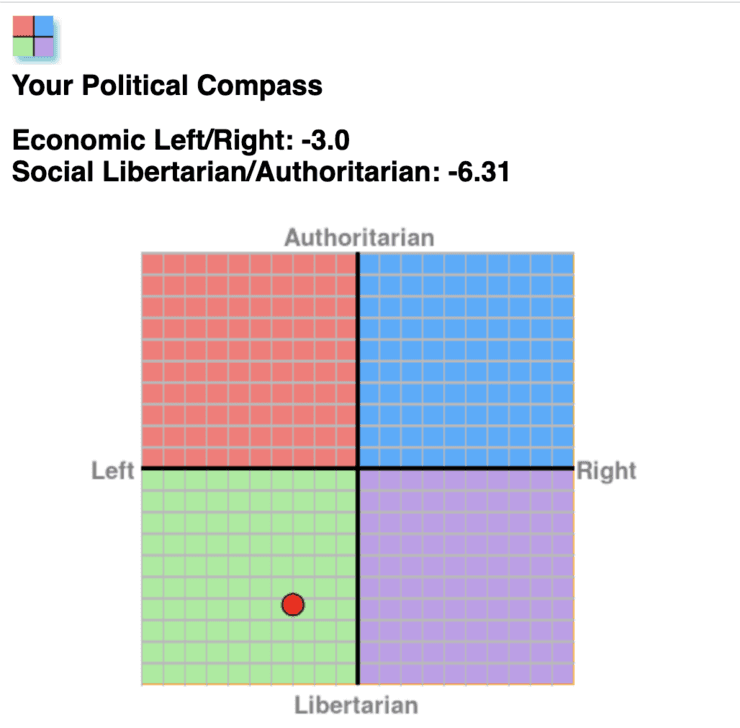My 2020 California Ballot
October 23rd, 2020It’s election time! I like to arguetalk about politics, and friends have told me that they don’t always know what I actually believe. I thought I’d share my ballot to put my money where my mouth is! While I’m in Boise this month, I’m registered to vote in Dublin, California.
According to this political compass site, I lean economic-left, social-libertarian:

I identify most closely with the Democratic party - if forced to choose based solely on party affiliation, I’ll take the Democrats every time.
Scott Alexander of Slatestarcodex fame makes a compelling argument against California propositions, so, like him, I have an initial bias towards voting “No” on propositions.
This election cycle, I care most about:
- A return to political normalcy. Over the last decade, politics has grown increasingly partisan - which may be a rational strategy.
- Effective COVID response:
- We should have national guidelines backed by science, but policymaking should reside with state & local authorities who can respond more effectively. This is the whole point of federalism!
- We need continuing economic stimulus - of course pumping money into the economy isn’t ideal, but desperate times call for desperate measures. We should be primarily focused on short-term recovery.
Now, on to my ballot!
Federal Offices
President: Joe Biden
- A vote for Biden is a vote for stepping back from the hyper-partisan edge. Biden has a track record of reaching across the aisle - I hope (perhaps naively) that his presidency will reduce political rancor.
House - 15th Congressional District: Eric Swalwell
- Swalwell’s a Democrat running against a Republican.
State Offices
State Senator - 7th District: Steve Glazer
- Steve’s a Democrat running against a Republican.
State Assembly - 16th District: Rebecca Bauer-Kahan
- Rebecca’s a Democrat running against a Republican.
Superior Court Judge, Office #2: Elena Condes
- Mark Fickes doesn’t seem to actually be a civil rights attorney. Condes has many more endorsements from liberal judges than Fickes, and has a track record of fighting for vulnerable people.
Local Offices
Dublin USD Board Member, Area 1: Dawn Nwamuo
- As a medical professional, Nwamuo seems well-suited to helping DUSD navigate COVID.
Alameda County Supervisor, 1st District: David Haubert
- I didn’t know what a county supervisor did before this election! Apparently, every county in California is managed by a five-member board of supervisors.
- Haubert supports building market rate over affordable housing, which seems to me like a more effective strategy that won’t further distort our housing market.
Dublin Mayor: Melissa Hernandez
- Unlike Regina Pangelinan, Hernandez is a city council member. Unlike Arun Goel, Hernandez isn’t committed against market rate housing growth. Obvious choice for me.
Dublin City Council: Kashef Qaadri and Sri Muppidi
- Literally every other candidate opposes new housing development in some way. We should be growing!
BART Director, District 5: Mike Wallace
- BART is a financial tragedy. Wallace has a financial background - maybe he can help.
State Propositions
Prop 14: No
- Prop 14 authorizes $5.5B in bonds for stem cell research.
- Stem cell research is probably important - but why is this measure before the uninformed people rather than the state legislature?
Prop 15: Yes
- Prop 15 effectively repeals Prop 13 for commercial and industrial real estate worth more than $3M.
- This seems like a win to me - why should big businesses have property tax benefits based on how long they’ve owned the building?
Prop 16: No
- Prop 16 allows government agencies to consider race, sex, color, ethnicity, and national origin when making decisions - this repeals the Prop 209 from 1996 which disallowed those factors. The justification is to “address diversity”.
- Allowing the government to consider “race, sex, color, ethnicity, or national origin” for anything is really scary. I believe that the authors of the proposition have good intent, but legalizing government discrimination seems like a worrying intensification of identity politics.
Prop 17: Yes
- Prop 17 allows convicted felons to vote after they’ve served their prison term.
- We shouldn’t permanently remove felons’ right to vote if they have completed their prison term and are trying to restart their lives in the general population. In general, we should enfranchise as many people as possible.
Prop 18: Yes
- Prop 18 allows 17-year-olds who will be 18 & eligible to vote for the general election to vote in primaries.
- As with the last proposition - we should enfranchise as many people as possible. If you’re going to vote in the general election anyways, you should have a voice in who ends up on that ballot.
Prop 19: Yes
- Prop 19, like Prop 15, reduces the scope of Prop 13 while maintaining exceptions for the disabled and elderly. In particular, children would now only inherit lower property taxes from one of their parent’s properties instead of all of them, and any properties worth more than $1M at the time of inheritance would have their property tax increased as well.
- Overall, artificially low property taxes contribute to NIMBYism and stagnation: why would I move out of my house of 30 years, even if it doesn’t make sense for my living situation, if it means my property taxes could double or even more? I’ll take any chance I get to chip away at Prop 13.
Prop 20: No
- Prop 20 limits parole access for certain non-violent crimes like theft.
- Non-violent crimes should generally not result in jail time. We certainly shouldn’t restrict parole from non-violent offenders. How did this even make the ballot in California?
Prop 21: No
- Prop 21 allows local governments to establish rent control on properties over 15 years old, which is currently controlled by the state.
- Most economists are against rent control - arguing that rent control has not positively impacted affordable, quality rental housing.
Prop 22: Yes
- Prop 22 classifies Uber and Lyft drivers as contractors, not employees. In particular, it overrides California AB5 which defines those drivers as employees.
- Prop 22 is definitely a “national news” prop. Two points in favor of this proposition:
- Uber and Lyft are legitimately good public services. They make city transportation more efficient and help mobilize certain populations (I’m mostly thinking of disabled people here) that would otherwise be dependent on caretakers. Therefore, since Uber & Lyft are threatening to leave the state if this prop doesn’t pass, we should vote Yes.
- There’s a libertarian argument here too - parties should be allowed to enter into mutually agreed contracts with one another. Why should the state government have the power to interfere?
Prop 23: No
- Prop 23 requires dialysis clinics to have a doctor, nurse practitioner, or physician assistant on site.
- It seems like requiring a doctor equivalent on-site for a dialysis clinic could force many clinics to shut down - these people don’t grow on trees. If clinics shut down, people could lose access to dialysis - an obviously bad outcome we should avoid.
Prop 24: No
- California passed the CCPA last year. This prop updates it in the following ways:
- changes the threshold for data privacy requirements from 50,000 consumers, households, or devices to 100,000 consumers or households (removing devices). This is probably a bigger change than it sounds - most consumers have multiple devices, so this probably increases the threshold by 3-5x, not just 2x.
- gives new rights to consumers to “limit sharing of personal data”, “correct personal data”, and “limit use of ‘sensitive’ personal data”
- establishes penalties for misusing minor’s information, and enforces penalties for violations even if businesses address them within 30 days of notification
- establishes penalties for data breaches resulting in account access
- establishes an agency to enforce all of this
- Overall this seems pretty poorly constructed. It fails to address gray areas from the original CCPA and introduces some new ones.
Prop 25: Yes
- Prop 25 approves an already existing law that replaces the bail system in California with a new system that would release individuals based on flight risk and danger to society.
- The law seems reasonable. Also, the state legislature already approved it! Why is it in front of the people?
Local Measures
Measure V: Yes
- Alameda County originally passed this proposition in 1992. Utility users taxes seem fairly common, at least in the Bay Area. Vote for the status quo!
Measure W: No
- California cities have historically been extremely bad at managing homelessness funds. I see no reason why this measure would be any different - so I’d prefer to not light $150M on fire every year.
